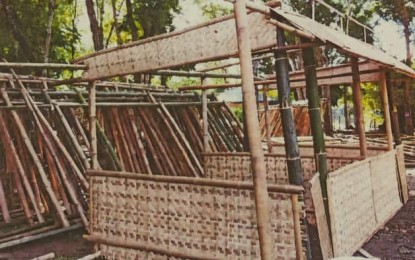 KIOSKS MADE OF BAMBOO. "Bahay Kubo" inspired food kiosks will be used during the three-day Ilonggo Food Festival starting January 24. The kiosks are being prepared by the town of Maasin, the bamboo capital of the Philippines. (PNA photo by IFFI)
KIOSKS MADE OF BAMBOO. "Bahay Kubo" inspired food kiosks will be used during the three-day Ilonggo Food Festival starting January 24. The kiosks are being prepared by the town of Maasin, the bamboo capital of the Philippines. (PNA photo by IFFI)
Around 300 bahay-kubo inspired kiosks will be welcoming gastronomic enthusiasts during the three-day Ilonggo Food Festival, starting January 24 as one of the events lined up for this year’s Dinagyang Festival.
“We will showcase the craftsmanship of the people of Maasin (Iloilo),” said Phillipp Chua, chairman of the new and special events group that likewise handles the kiosk sales and management of the Iloilo Festivals Foundation Inc. (IFFI) in a press conference Wednesday.
The town of Maasin is named as the Bamboo Capital of the Philippines. About 5,000 hectares of the town’s area is planted with bamboo, Mayor Francis Amboy in a separate interview on the same day said.
The kiosks will be situated along Aldeguer, Iznart Arroyo and part of Ledesma streets.
Apart from the kiosks sanctioned by the IFFI, there will also be food kiosks that will be managed by the “Kaon Ta Iloilo (Let’s Eat in Iloilo)” (KTI), Iloilo Hotels, Resorts and Restaurants Association (IHRRA) and those by the Association of Barangay Captains (ABC).
Around 50 kiosks of the KTI, supported by Panay Electric Company (PECO) will be mounted along Arsenal Street, while some 80 kiosks of the ABC will be on Solis Street.
IHRRA will have more than 30 kiosks along Delgado Street.
However, the design for the kiosks of the KTI, IHRRA, and ABC will not necessarily be similar to the kiosks by the IFFI.
Amboy said the initiative of the IFFI asking their bamboo growers to construct kiosks, measuring four meters by four meters and stands eight feet by seven, will be beneficial to people of Maasin.
“This is an opportunity for us to showcase kiosks that are made of bamboo,” he said.
The project, he said, has benefitted 100 skilled workers in Maasin.
He added that 2,000 to 3,000 pieces of bamboo are utilized for the kiosks costing around PHP300,000. Each kiosk costs PHP 3,500.
“This has a big impact. First, we create employment and second we can showcase our product. It’s an opportunity that we were chosen to provide kiosks for Dinagyang,” Amboy added.
Amboy hoped the bamboo industry in his municipality will continue to grow, especially with the plan of the Environment Secretary Roy Cimatu to construct a PHP100 million bamboo plant in the town this year.









